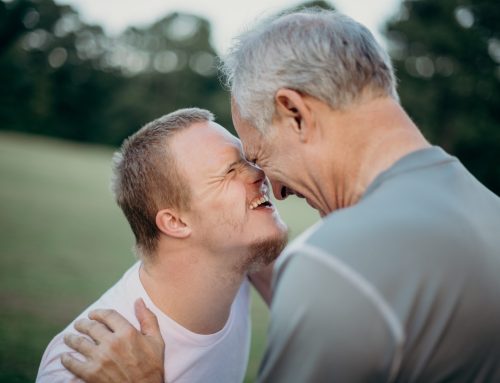All the answers to the most common doubts we may have when we decide to go on holiday by plane with our loved ones.
“Travelling and changing places revitalises the mind"said the philosopher Seneca. Doing so with an elderly person, however, requires planning and some considerations that should not be underestimated. If you are going to travelling by plane with elderly people, we want to offer you all the information on existing accessibility services and tips for flying with complete peace of mind. Knowing what airports offer, and what to take into account before leaving, can be very useful in order not to risk any unpleasant surprises.
Can elderly people travel by plane?
Of course yes, regardless of age. It is important, however, that the elderly person is accompanied during the flight to guarantee him/her support throughout the entire journey. If this is not possible, it should be ensured that he is accompanied to the airport for boarding and that he is met by a family member upon landing outside the airport.
The important thing for a elderly person who wants to travel by plane is that it does not suffer from serious illnesses that could compromise your health while travelling. It is important to be able to consult your family doctor in advance for any specific questions or pathologies.
The plane is undoubtedly one of the safest and most comfortable means of transport, but it is true that when it comes to elderly people, certain aspects must be taken into account:
- It is better to prefer short trips of no more than 4 hoursas recommended by the World Health Organisation (WHO), to avoid cases of thrombosis during the flight. This also avoids annoying situations such as muscle or joint pain due to maintaining the same position.
- La atmospheric pressure can cause serious respiratory and ear problems.
What is the maximum age for travelling by air?
There are no age limits. It is only recommended that the elderly person is in good health, follows the doctor's recommendations and is accompanied as far as possible.
When is air travel not recommended?
Le most common pathologies that may cause inconveniences during the flight are as follows, in each case as recommendations and never as prohibitions:
- Elderly people with severe respiratory infectionssuch as pneumonia or tuberculosis.
- Cardiovascular diseasessuch as heart attack and chronic heart disease.
- Mainly patients, with acute thromboembolic diseasebecause they could suffer a thrombosis during the flight.
- Not in all cases, but the elderly subjected to chemotherapy or radiological treatments because they may have problems due to fatigue, tiredness or dizziness.
- People with recurrent or permanent ear diseasessuch as sinusitis otitis dizziness or tinnitus, as the high pressure could further damage and disturb the passenger.
What does an elderly person need in order to travel?
If possible, the elderly should be accompanied for the duration of the flight. Otherwise, they should have someone to accompany them and pick them up at the airport.
You must always carry necessary medicines, especially if it is a serious condition, to be used in an emergency.
You must bring documentation and emergency telephone numbers in case the airline staff needs to contact a family member.
Is it advisable to take out travel insurance?
Yes. Taking out travel insurance is advisable in order to be provided with medical care. Many companies offer this type of insurance for persons over 65 years of age.
Travel insurance protects the traveller against any inconvenience and represents the certainty of embarking on a holiday protected from any risk, such as illness or accident.
Tips for seniors who decide to travel by plane
We recommend do not travel with a backpack or any other accessory under your feetso that you can extend your legs as far as possible and have more space.
We must not forget that airlines require measurements for the aids we want to carry on the plane, corresponding to height, width and weight. In this regard, Mia Medical Italia provides cards and certificates of conformity for all the aids it offers.
Despite the price of drinks at airports, don't forget to purchasing water directly at the airport or on the plane. It is important to stay well hydrated during the flight.
It is important to have the preventive recommendation by the family doctorwhich will analyse whether there are specific illnesses that may affect the air travel of the elderly.
We also recommend travelling with 3 layers of clothing (underwear, jumper or blouse and coat) to avoid temperature fluctuations during the flight. Sometimes, both in airports and on the plane, it is very hot and on many other occasions very cold.
Be sure to store the medicines needed by the elderly in hand luggage and not in hold luggage.
Avoid small airports if you are travelling with an older adult, because your loved one may have to use the stairs to get on or off the plane. The larger airports are better equipped to offer assistance. For instance, most of them have hotels inside or very close by in case of flight cancellation.
A person from the family should take charge of purchasing airline tickets and should inquire whether, for example, their loved one might need a wheelchair to reach the gate or aircraft door. Be sure to check the respective regulations, and whether airlines provide discounts for senior citizens. For example, some of them require a preferential boarding pass on arrival at the airport, others make a boarding call for those who need assistance, and still others have to be contaRed by phone before the date of travel.
Itineraries should be modified to include a sufficient rest time between activities and do not exceed energy reserves. Naps, frequent toilet breaks, regular breaks and a pace suited to the abilities of older travellers will make the journey more enjoyable for everyone. - If you are travelling with an electric aid, be sure to take the battery data sheet. Remember that not all batteries can be loaded in the hold and you must therefore check that it is suitable, otherwise, it will have to be disassembled and brought on board. Consider purchasing or renting a lightweight, portable wheelchair. For airlines, wheelchairs are not considered baggage and can be taken with you to the aircraft door and collected at disembarkation, ready to be used.
Want to travel in comfort?
Rent our self-propelled folding wheelchair now!
Travelling is one of the best things to do at any age and getting older does not mean you have to stop doing it! It is true that elderly people who decide to travel by plane can take risks and that is precisely why it is important to leave prepared. With proper planning and by recognising the limitations of our loved one, we can take the right precautions and adapt so that the trip remains not only a feasible activity, but also an enjoyable event for all of us.
Happy Holidays!





